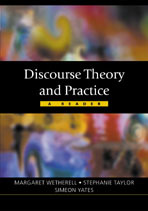Discourse Theory and Practice
A Reader
- Margaret Wetherell - The Open University
- Stephanie Taylor - The Open University, UK
- Simeon J Yates - Sheffield Hallam University, UK
Discourse Analysis
Discourse Theory and Practice is much more than a collection of key classic articles and papers in the field of discourse analysis. The aim of the book is to introduce students to the major figures in the field, and to some of their writings which, combined with the interspersed editorial commentaries, should allow students to understand the key epistemological and methodological issues of discourse theory and practice.
The Reader is organized into four coherent parts, namely: Foundations and Building Blocks; Social Interaction; Minds, Selves and Sense-Making; and Culture and Social Relations. Key readings include works by Stuart Hall, Jonathan Potter, David Silverman, Erving Goffman, Teun van Dijk, Derek Edwards and Michael Billig. Chapters introduce the student to each individual and their reading, contextualizing each in terms of their contribution to the field, theoretical standpoint and individual method of doing discourse analysis. The many didactic elements of the book make it ideal as an introduction to the study of discourse for all students of psychology, sociology, linguistics or cultural studies.
This book is a course reader for The Open University course Discourse Analysis (D843).
`A highly effective introduction to the range of approaches found in discourse analysis… a lively and intellectually stimulating Reader' - David Silverman, Goldsmith College, University of London
This book is incredibly comprehensive, with very clear and helpful explanations of different discourse analytic approaches.
All-encompassing, accessible while retaining depth, this is a useful resource for anyone interested in the history and application of discourse analysis
A must have text for all students (undergraduate and postgraduate) wishing to pursue discourse analysis research.
This book contains the texts that are used as examples in the "parent" book "Discourse as Data". However, the collection stands in its own right as a fascinating insight into the range of discursive representations that often pass us by as sources of meta-information on a text and its speaker. I also value the information on notation and how to markup, and indeed identify, linguistic and paralinguistic cues.
An excellent text for those looking to understand more of the theory and history behind contemporary approaches to qualitative analysis. Highly recommended to my Doctoral students, particularly alongside the companion volume "Discourse as Data: A guide for analysis".
This is a wide ranging review of issues related to discourse theory. I may point PG students who are exploring more interpretive methods of research to this book, but it is quite specialised, and presumes some prior knowledge about discourse theory.
Very useful and comprehensive guide to discourse analysis. I will be recommending it on the course
It is a very comprehensive book. The selection of articles is well done.

